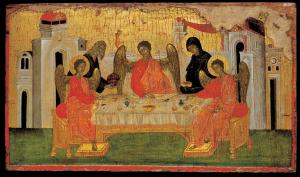
It is good for us to develop a way of life, a discipline or rule of life which helps keep us focused doing what is right and good. But we must remember that there is a hierarchy of goods, and we must not absolutize some secondary practice, even if it is a good one like fasting, if it gets in the way of the greater good, such as our proper treatment of others. We can fast all we want, but without love, it is nothing. We can pray night and day, but if we get angry when we are interrupted by the needs of our neighbor, it ends up all for naught. We can receive the eucharist every day, but are we truly worthy to receive our daily supersubstantial bread if we fail to show hospitality to those who come to us with their needs?
Thus, whatever discipline we establish for ourselves should always make room for prudence. We must avoid a legalism which kills the spirit. Or, we can follow the example of an anonymous desert father, who found that he could and would establish the preferential option for the needs of the others as a part of his rule, making sure that there was already including in his rule the flexibility which legalism denies:
A brother visited an elder and said to him as he was leaving, “Forgive me, Abba, for I distracted you from your rule” but in answer he said to him, “My rule is to give you refreshment and sent you on your way in peace.”[1]
Abraham’s greatness, and indeed, the greatness of his nephew Lot, can be seen in the way he showed hospitality to strangers. Indeed, because of his great hospitality, Abraham had an experience of God at Mamre, one which revealed to him (and through him, to us), a little of the mystery of the Trinity. Love is personal. Those who follow the path of love will encounter others with that love, and in that encounter, they will be able to discern the presence of God, for God is love. On the other hand, those who do not act out of such love, those who close themselves off from its dictates, risk ending up like the people of Sodom and Gomorrah, suffering in the hell of their own making.
If we merely follow some set of rules which we make for ourselves, turning its dictates into absolutes instead of relative goods which can sometimes be transcended, we end up cutting ourselves from the Spirit of Life. As the Spirit blows as it wills, if we follow it and its directions, we will find it taking us far beyond the boundaries established by our rules. For our rules are always going to be limited. The transcendent good found in and with God, the transcendent good which gives us true and eternal joy, is without such limits. If we seek after the transcendent reality found in a proper relationship with God, we must always transcend ourselves, and the conventions which we create out of our finite nature. The Spirit helps us do this. It directs us beyond ourselves, beyond all that we could ever think or imagine doing, but only if we give up our own desire for self-control, a desire manifested in those who are especially interested in creating and absolutizing a set of rules for themselves.
When trying to act in prudence, when trying to discern how to act in the concrete reality we find ourselves in, we must follow the greatest commandment, love, and discern what love would tell us to do. When we love God, and in and through our love of God, love our neighbor, we will fulfill the good. Whatever we hope to accomplish through our own rules and disciplines which we create for ourselves can be and will be fulfilled by love. This is exactly the point another desert father made in relation to fasting:
Two brothers once came visiting an elder; it was the custom of the elder not to eat every day. When he saw the brothers, he joyfully welcomed them in, saying to them, “Fasting has its reward, but he who, out of love, eats against fulfills two commandments, for he abandoned his own will and fulfilled the commandment, having refreshed the brothers.” [2]
The desert fathers, though they lived strict ascetic lives, found their salvation lay, not with extreme ascetic discipline, but in love. All rules and regulations should serve the development of love. Disciple is important, but it is powerless by itself. It becomes a legalistic trap so long as it remains a mere rule without the power of grace and the livelihood of the Spirit. This is why many sayings of the desert fathers talk about ways in which rules were broken for the sake of some higher, greater good, so that those who followed after the desert fathers would do so, not by absolutizing or idolizing their discipline, but by recognizing how it was a tool which could be, and should be, dispensed with when greater needs, greater goods, are required.
We should not get distraught when we are expected to do something out of the ordinary for the sake of our neighbor. We might be used to following a particular good, like going to liturgy and receiving the eucharist, but if doing so would end up hurting our neighbor, we must question what is in our heart and whether or not receiving communion in such a circumstance is truly done in a worthily manner. Jesus, after all, criticized those religious leaders who thought their need to worship in the community of the faithful outweighed their duty to their neighbor in the parable of the Good Samaritan. When the priest and Levite saw the wounded traveler, they could have, and should have realized that they would be following God by taking care of their neighbor, and since they did not, their worship was in vain. Likewise, we must realize the good of our neighbor, and if we cannot and should not go to church because of the needs of our neighbor, we must realize the spiritual communion we receive in our desire for the eucharist gives us greater graces than if we unworthily receive communion by ignoring what we can and should do for our neighbor. For what is important, what is meant to be established in communion, is that increase in love which we lose if we deny the expectations love places upon us when we are met with them. This is why, even great disciplines, set up by the church itself, can be dispensed, and if they are, we should not be upset, but rather recognize in such dispensation, the church is following the higher way of love established by Christ. Hopefully, we will be able to learn this lesson and put it into practice in our daily lives.
[1] John Wortley, trans., The Book of the Elders: Sayings of the Desert Fathers (Collegeville, MN: Cistercian Publications, 2012), 226 [N283].
[2] John Wortley, trans., The Book of the Elders: Sayings of the Desert Fathers, 227 [N288].
Stay in touch! Like A Little Bit of Nothing on Facebook.
If you liked what you read, please consider sharing it with your friends and family!













